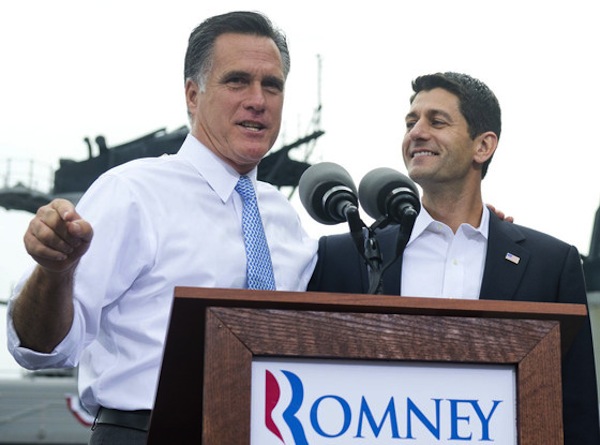
Paul Ryan and Mitt Romney. Source: Getty
Like many of you, I’m eager to see how the candidates and their supporters will discuss foreign policy at the Democratic Convention (DNC) and the Republican National Convention (RNC). Over the past month, as a result of Mitt Romney’s overseas campaign trip and Paul Ryan’s entry into the race, major news outlets and the blogosphere have focused on Mr. Romney’s foreign policy platform with unprecedented attention. In this blog post at the beginning of the RNC, I’ll briefly highlight the role that foreign policy has played in the Romney-Ryan campaign in the last month.
Foreign policy has emerged as a challenging area for Mr. Romney. President Obama has enjoyed strong approval ratings for his national security track record, a track record that, of course, includes Osama bin Laden’s death. It will be difficult for Mr. Romney (as it would for any other candidate at this point in time) to present himself as a strong national security alternative to President Obama.
Arguably, Mr. Romney’s attempts to bolster his foreign policy credentials so far have served as a liability than an asset. Mr. Romney’s controversial remarks about the London Olympics, the British intelligence service, and the Palestinians generated headlines and drew ire. In my opinion, the strategic value, not to mention the inherent value, of a U.S. presidential candidate campaigning overseas is debatable—and as Foreign Policy’s Joshua Keating points out, it’s a relatively recent tradition too. In an insightful opinion piece about the candidates and the crisis in Syria, Brookings guest scholar Marvin Kalb argues:
Once upon a time, in the fairyland of American presidential politics, it used to stop at the water’s edge. A candidate for the nation’s highest office would not criticize a president’s foreign policy, certainly not during the heat of a presidential campaign. Not right, it was thought, for such criticism might be exploited by America’s enemy. As you may have noticed over recent years, that inhibition has melted away, and sadly the American people seem not only not to have noticed but seem to approve of the political combat.
In even more recent developments, Paul Ryan’s short time as a vice presidential candidate has generated more op-eds and commentary about foreign policy than I ever could have expected. As I’ve written, polling data strongly suggests that voters’ concerns about the economy overwhelmingly outweigh their concerns about foreign policy. Moreover, the office of the vice president plays a stereotypically unexciting role in American politics. However, perhaps because Mr. Romney has little foreign policy experience — or perhaps simply because of the reactiveness of the blogosphere and Twittersphere to the vicissitudes of the election — Mr. Ryan’s foreign policy views were quickly interpreted as a true insight into how foreign policy would look under a Romney presidency.
To list just a few of the reactions to Mr. Ryan’s potential role in foreign policy:
- Author Pete Troilo of Devex, a website for international development professionals, wrote an article about Mr. Ryan notable for its specificity — “Ryan VP pick could yield clues on Romney’s foreign aid plans” — which discusses Ryan’s relevant budget proposals.
- Kori Schake, a research fellow at the Hoover Institution, lauded Mr. Ryan’s foreign policy vision while criticizing the Obama administration’s fiscal priorities. As she states, “Just as [Ryan’s] arguments for putting our entitlement programs on sound footing are tied to bigger ideas of what kind world we want to live in, his arguments for our foreign policy are tied to what kind of world we want to live in—the bigger ideas of advancing freedom and helping build institutions that preserve it.”
- Mr. Ryan himself jumped right into the debate over his foreign policy credentials, remarking in a television interview, “I’ve gone to Afghanistan and Iraq to meet with our troops, to learn from them. Obviously, I have a lot more experience than Barack Obama did when he became president.”
- Reacting to Ryan’s above comments and comments in the same interview about voting to send American troops into war, journalist and author Joe Conasan argues, “What Ryan cites as his chief qualification to serve as commander in chief is a series of votes that represent the most fateful, expensive, inexcusable error in recent American history. For him to cite that vote to draw a contrast with President Obama, who got the Iraq issue right, is startling. It reveals something that Americans need to know before he gets any closer to executive power.”
In my opinion, in addition to its policies and worldview, the tone that a presidential administration sets in dealing with the rest of the world plays an important role in U.S. soft power and an administration’s ability to get things done. I look forward to hearing what the candidates have to say about foreign policy (and how they say it) over the coming weeks.